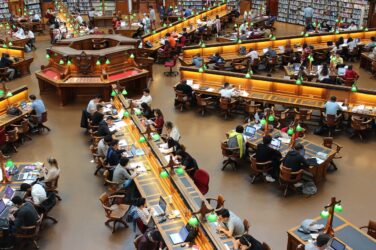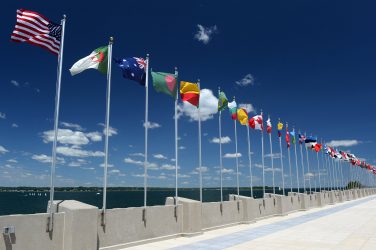As Covid-19 dominates newsreels, parliaments, and our collective consciousness, Ana-Christina Gaeta reminds us of another ongoing crisis: the climate emergency. Considering climate change’s devastating impact on us and our environment, she wonders what would happen if governments and corporations reacted with the same aggressive impulse to divest from fossil fuels as they have responded to the current pandemic.
The COVID-19 frenzy has shaken the world in a fundamental way. The current pandemic is being perceived as the apocalyptic threat, overshadowing the fact that for some years now, climate change has been widely recognized by science as the greatest threat to humanity. Even today, during the peak of the COVID-19 crisis, this fact continues to be true.
The health effects of climate change are real and they are prevalent. Toxic air pollutants alone, “such as carbon monoxide and ozone, are responsible for over seven million deaths each year, about one in eight worldwide.” Although the COVID-19 deaths are mounting on a daily basis, the degree of casualties do not compare with the number of deaths linked to climate threats.
Why has the world surrendered to the COVID pandemic, while continuing to ignore climate dangers?
The way the novel Coronavirus affects people varies drastically across nations and across social and economic ladders. While some people only lost their holidays, many have lost their jobs, their homes, and some their lives. Whatever each person’s reality is, the pandemic is forcing humans to deal with unexpected emotions. We are being forced to step outside ourselves in order to analyse our position in the inseparable social web that has been consolidated by globalisation. In less than two weeks, the virus spread across the world. The current pandemic is reminding us that we are all interlinked, and the only way to separate ourselves from somebody on the other side of the world is quite literally through isolation within the walls of our own home.
When trying to understand the specific triggers that push people to take drastic measures as a means to protect themselves from threat, the proximity of the threat seems to be the most powerful factor to influence change. Science is important, they say, but when it comes to human emotions and decision making about one’s lifestyle, science has demonstrated to be nearly irrelevant.
The weight of these determining factors has become more evident than ever during the Coronavirus frenzy. People are being told that although they may not feel symptoms, they may still be infected and thus capable of contaminating vulnerable individuals. This single piece of information which is “backed up by conclusive science” is enough to convince people to completely change their lifestyle, daily routine, and yearly plans.
Every single day of the year we are bombarded by alarming new and conclusive science about the adverse impacts that climate change is already having on human health and the economy.
The scale of response and citizen’s compliance bears a huge contrast with the degree of inaction that is taken to fight climate change. Literally, every single day of the year we are bombarded by alarming new and conclusive science about the adverse impacts that climate change is already having on human health and the economy. Hurricanes, wildfires, toxic air pollution, deforestation, soil erosion, crop failure, animal extinction – the list goes on. People are getting sick and dying on a daily basis from climate catastrophes, and still, environmental policy is a joke to human competence.

When trying to understand the factors that stirred far quicker appreciation of the dangers of COVID-19, a few come to mind. Firstly, the degree of commitment necessary and the measures being taken to curb COVID-19 are temporary. We must also consider that for many fortunate people who did not suffer massive transformations to their lives and careers, staying within the comfort of one’s own home and having permission from work to do so does not exactly require a massive sacrifice on one’s behalf. The sacrifice seems relatively small for such a large gain, after all, we are being told that we could save lives by merely staying home. When it comes to climate action, it is the opposite; there is very little short-term return for a relatively large investment. For the climate, we must change many aspects of our lifestyle for good, we must actively advocate our local and national governments, and ultimately put the green economy agenda at the top of our personal and professional lives. When you compare this to staying home and watching Netflix, it’s a lot.
But beyond the degree of necessary sacrifice, social pressure certainly plays a significant role. We are merely following the global advice to stay in isolation, and if we don’t, we fall prey to social shame for being irresponsible citizens. While in the case of climate change, inaction is the norm, and, thus, we follow that, too.
It is impossible not to mention the defining role that the fossil fuel industry, the wealthiest of all industries, has played in manipulating science, public opinion, and public policy in their favor. This has certainly been the greatest barrier to a smooth transition to a green economy. While in contrast, there is no single industry actively denying and lobbying against the novel Coronavirus.
The lessons we are learning from the current pandemic is that where there is a will, there is a way.
What the COVID-19 reaction is showing us, is that it is possible for governments, companies and individuals to implement change to their practices and lifestyles in a short amount of time. Governments and companies have shut down the world despite the risk of an economic recession worse than the one of 2008 in order to stop the spread of this virus. The lessons we are learning from the current pandemic is that where there is a will, there is a way. What if governments and corporations reacted with the same aggressive impulse to divest from fossil fuels? And if only the same social shame was applied to people who don’t care to recycle, or to companies responsible for mass deforestation and air pollution? Why are we not shaming those responsible for massive environmental devastation the same way we shame people who decided to jump on the opportunity of ‘cheap travel’ instead of staying home?
Nevertheless, the greatest lesson we are learning is that global change will not come through individual actions and decision-making. Rather than relying on an individual’s judgement to make the “right choice” of not sending their kids to school in order to avoid the spread of the virus, the necessary action is to close the school all together. In this same way; rather than depend on people to stop using fossil fuels, fossil fuels must be banned. In order to effectively implement global-scale systemic change for the well-being of humanity, the measures must be mandatory.
The human detox
As we all sit at home in social isolation and the economy is headed for an inevitable crash, the environment is reaping the benefits of our absence. When the virus began spreading across China in late January, entire regions shut down, and China’ s air-pollution levels decreased sharply. Italy has also seen immediate environmental benefits from its quarantine. In the absence of cruise ships and tourist traffic, the Venice canals which are notorious for their filthy water have cleared, and schools of fish were visible swimming along canal floors. The halt in global tourism has translated into less emissions and less waste. In less than two weeks, the environmental recovery of air and water quality across COVID-19 affected regions demonstrates how a day without humans is like a day at the spa for Mother Nature. Imagine what would happen after one year!
Let’s take this time to reflect on the irony of the current global situation; we remain in social isolation in order to avoid being contaminated, and in doing so we are refraining from contaminating the planet. Our absence is quite literally detoxifying the Earth. In other words, humans are to the Earth what Coronavirus is to us; we are the Earth’s pandemic.
If we wait until the impacts are clearly visible, then it is too late to stop the threat.
COVID-19 came to teach us a hard lesson; we are not prepared for a global crisis. We must take the necessary measures to prevent a crisis before it even occurs; if we wait until the impacts are clearly visible, then it is too late to stop the threat. The economic shock that the current pandemic is causing is an opportunity to rebuild our economies to be more resilient and sustainable. We cannot allow ourselves to be this vulnerable again, and in the face of climate change, we are not prepared for the array of threats that will come our way.
If we take all of the lessons COVID-19 is teaching us about ourselves, our lifestyles, the economy, our relationship with the planet and other animals, and we put them to good use, we can turn this pandemic as the starting point for a new era of greater awareness about our interconnectedness with all living beings. Understanding this is the first step to building a resilient and sustainable green economy.
As we cure humanity from the COVID-19 virus, let us also cure the Earth from the human pandemic.
If you want to find out more, read my previous article about why it is so difficult to care about climate change.
Cover photo: Markus Spiske (Unsplash), Unsplash licence











Show Comments
Susana Perezsalvatierra
Ha sido interesante leer tu opinion al respecto y como comparas esta Pandemia de ahora con el cambio Climatico. Me parece que todos debemos de ser conscientes, tanto de una cosa como la otra.Estoy de acuierdo contigo en que hemos llegado a ser nosotros mismos una verdadera Pandemia para la Tierra, pero hemos de considerar tambien que a lo largo de la historia conocida de la Tierra, hubo muchos camios climaticos, constituyen una realidad. Se sabe de manera cientifica que hubo aÑos mucho mas calientes en la histiria geologica de la Tierrra que estos recientesy ahora el CO2 esta muy por debajo de muchos de entonces.Y estoy habblando de antes de la era industrial, 250 años antes de cualquier calentamiento por influencia del hombre.Periodo de calentamiento Egipcio, P. Calentamiento Romano, P.C.Medieval ( que se le llamo Optimo Climatico,la gran epoca colonizadora de los Vikingos,en Groenlandia por elejemplo crecian viñedos…fue una epoca de prosperidad), despues una Pequena edad del hielo y ahora este Periodo de Calentamiento Moderno. El frio mata unas 20 veces mas que el calor.A lo largo de la historia geologica de la Tierra lo hemos estado viendo. Creo debieramos hacer una revaloracion de todo esto y poner en evidencia ambas teorias sobre “Cambio Climatico”, de echo ya no hablan de Calentamiento Global, cambbiaron el nombre.No me malinterpretes, estoy a favor de un planeta limpio, sin talas desmedidas, etc. pero que hablen con la verdad. En los ultimos 10 años la Temperatura globbal de planeta no ha cambiado (Dr. Solommom Kroonenberg, geologo, enter otros)y en los ultimos 13 años el CO2 aumenta pero la Temperatura queda igual.No hay correlacion entre la Temperatura y el CO2. Lo que quiero decir es que hay otros muchos procesos naturales ; corrientes oceanicas, el Sol y sus ciclos, etc.Hace 2000 años el clima era mas caliente que ahoray hay observaciones hechas en la que se ve que cuando un Glaciar se retira resulta que debajo habia bosques. En fin no pararia de poner ejemplos y cientificos que apoyen esto.Ante todo esto siempre hemos visto que la tierra tiene la capacidad para reponerse . Eso si, de acuerdo contigo en promover enrgias renovabbles, pero seamos conscientes de que tb existen paises pobres que no pueden llevar el mismo ritmo que los ricos. Ha sido un gusto leer tu articulo, me lo envio tu madre. Saludos. Susana Perezsalvatierra.
Comments are closed.